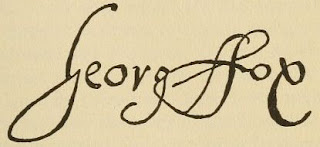Priesthood and Laity: The Quaker Understanding
Some say that Quakers believe in the 'priesthood of all believers', others assert that Friends have 'abolished the laity'. If one looks at the experience and understandings of the earliest Quakers, it becomes clear that for them the very basis of the priesthood-laity distinction had been superseded. This is because they believed that a new covenant was now in operation in which Christ acts as eternal high priest giving immediate and universal access to God. In such circumstances the human priesthood (whose principal role was to act as intermediaries or mediators between God and humanity) is abolished. If there is no longer a human priesthood, the idea of a laity becomes meaningless.
A New Covenant: Christ is Come to Teach His People Himself
A New Covenant: Christ is Come to Teach His People Himself
A key aspect of early Quaker understanding
is the belief that the coming of Christ has brought a new covenant (a new
relationship between God and humanity) in which the immediate presence of
Christ in Spirit has replaced the outwardly mediated ways in which God related
to humanity in the old covenant.
In the old covenant God’s presence was to
be found in a temple made of stone (The Temple in Jerusalem) and access to God
was mediated through a human priesthood (the Aaronic priesthood). The people of
God were led by human leaders (e.g. Moses) and God’s law (e.g. the Ten Commandments)
was written on stone. In the new covenant Christ fulfils all these outward and
mediated forms inwardly and spiritually. He is the spiritual substance of the
old outward covenant. Christ is the eternal high priest who offers everyone
access to God. As a result, God now dwells in a temple made of living stones
(the individual regenerated human body becomes a living stone in the new living temple or tabernacle which is the Body of Christ). Christ has become the inward and spiritual leader of God’s
people and he writes God’s law on their hearts (Jeremiah 31:31-34).
The early Quakers believed that the
primitive Christianity of the Apostles was the life of a gathered community
taught directly by the risen Christ (Gwyn 1986, p.36). They therefore believed
that the true function of preaching was to enable people to hear Christ’s voice
within them. When this was achieved there was no longer any need for human teachers
(Wilcox 1995, p.38). Such a view had far-reaching consequences for Quaker
practice and for the Quaker relationship with other Christian groups.
References
Gwyn, Douglas (1986) Apocalypse
of the Word: The Life and Message of George Fox 1624-1691 (Friends United
Press)
Wilcox,
Catherine (1995) Theology and Women’s
Ministry in Seventeenth Century English Quakerism (Edwin Mellen Press)


Comments
Post a Comment